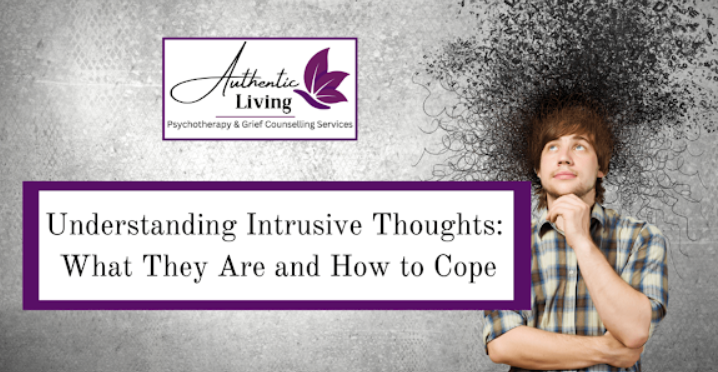Intrusive Thoughts: What they are and how to cope
- Aug 9, 2025
- 3 min read
Intrusive Thoughts: What They Are and How to Cope
If you’ve ever had a random, disturbing, or unwanted thought pop into your head out of nowhere, you’re not alone. These are called intrusive thoughts, and they can be confusing, upsetting, and even frightening. Many people wonder what they mean — and some even worry they might say something about their character. The truth is, intrusive thoughts are a normal human experience, but when they start to cause distress or interfere with daily life, it’s important to address them.
At Authentic Living London, we help people understand and manage intrusive thoughts so they can feel more at peace and in control.

What Are Intrusive Thoughts?
Intrusive thoughts are unwanted thoughts, images, or impulses that suddenly enter your mind. They can feel completely out of character, and they often go against your values or beliefs. Common examples include:
Imagining something bad happening to someone you love
Thinking about acting in a way you never actually would
Sexual thoughts that feel inappropriate or uncomfortable
Thoughts about self-harm, even if you don’t want to harm yourself
Reliving distressing memories from the past
These thoughts often seem to come “out of nowhere,” but they can be triggered by stress, anxiety, trauma, fatigue, or even boredom.
Why Do Intrusive Thoughts Happen?
Intrusive thoughts are part of how the brain works — we all have thousands of random thoughts every day. They can be a sign that your brain is scanning for danger or processing unresolved experiences.
They’re especially common when:
You’re feeling anxious or stressed
You’ve experienced trauma
You have OCD, PTSD, depression, or another mental health condition
You’re going through major life changes or loss
The key thing to remember: having an intrusive thought does not mean you want to act on it.
The Problem With Fighting Intrusive Thoughts
It’s human nature to want to push away thoughts that feel scary or wrong — but that often makes them come back stronger. This is sometimes called the “white bear” effect: if you tell yourself not to think about a white bear, it’s all you can think about.
When you try to suppress intrusive thoughts, your brain sees them as important, and gives them more attention.
Healthy Ways to Cope With Intrusive Thoughts
Name It for What It Is - Remind yourself, “This is just an intrusive thought. It’s not a reflection of who I am.”
Don’t Judge the Thought - Intrusive thoughts are not moral failings. They are brain events, not intentions.
Let the Thought Pass - Instead of wrestling with it, notice it and let it float by like a cloud.
Focus on the Present Moment - Ground yourself with sensory awareness - notice 5 things you see, 4 you touch, 3 you hear, 2 you smell, and 1 you taste.
Limit Triggers When Possible - Reduce stress, fatigue, or environments that seem to spark these thoughts.
Talk to Someone You Trust - Sharing the experience can remove shame and help you see it more clearly.
Seek Professional Support - Therapy can help you understand why intrusive thoughts are happening, reduce their frequency, and change how you respond to them.
When to Get Help
It’s time to reach out for professional help if:
The thoughts are constant or highly distressing
They cause you to avoid certain places, people, or activities
They are linked with anxiety, depression, trauma, or OCD
They include urges to harm yourself or someone else
At Authentic Living London, we approach intrusive thoughts with compassion and curiosity, not judgment. We work with you to understand the root causes, develop coping tools, and restore your sense of calm and safety.
You’re Not Alone
Intrusive thoughts can make you feel isolated, but they’re far more common than most people realize. The difference between someone who struggles with them and someone who doesn’t is not the presence of the thoughts; it’s how they respond to them.
If you’re feeling weighed down by intrusive thoughts, therapy can give you the tools and perspective you need to take back your mental space.
Book a session today at Authentic Living London, in person or online, and let’s work together toward peace of mind.








Comments